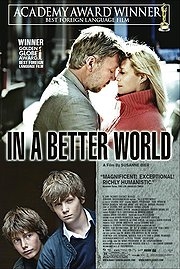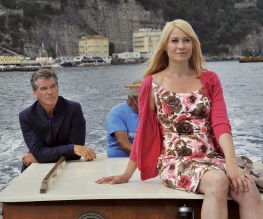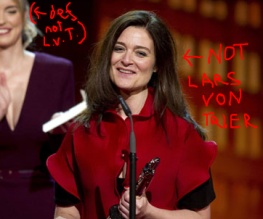In A Better World

Anyone familiar with the work of Danish director Susanne Bier will know that she’s a big fan of two things: brooding, claustrophobic familial tensions and jumping to locations that involve pretty (but tragically juxtaposey) head-scarves. Those who saw and enjoyed Brothers and/or After The Wedding will be relieved to know that all tropes are present and correct in her Academy Award winning In A Better World. Ambitious, troubling, impeccably performed and cannily-scripted, it’s just a slight shame that in throwing up messy questions of justice, revenge, forgiveness and pacifism, Bier feels the need to answer them quite so tidily.
Wide-eyed, buck-toothed and heart-breakingly innocent, young Elias (Markus Rygaard) isn’t having much fun. His parents are getting a divorce, he’s bullied mercilessly at school and his idol – his ruggedly Aslan-like doctor Dad – is off saving lives in Africa every other minute. Always taught by his parents to fight fire with, well, studious ambivalence, his world is turned upside-down when a boy named Christian (William Johnk Nielsen) joins his school and trumpets an entirely different coping mechanism. After stoically watching Elias suffer at the hands of the school oik, he grabs a bicycle pump and wordlessly pummels the smirking teenager to the ground. Brandishing a knife, he warns the boy to leave both him and Elias alone from then onwards, leaving him bleeding, crying and, admittedly, thoroughly taught. A brief encounter with the police later, where all three mechanically admit their wrongdoings under the bracing threat of expulsion, it seems to Elias that the fearless Christian is the answer to his prayers. But Christian is suffering through some dark emotions having just lost his mother to cancer and it isn’t long before this new philosophy – hit hardest and no-one will dare try to hurt you – leads them to places far more dangerous than the school playground.
Juggling the relationships between Elias and his parents (wonderfully played by Mikael Persbrant and Trine Dyrholm), between Christian and his dad (the ever-glorious Ulrich Thomsen), the boys themselves and, of course, the tensions of opposing theories of justice, you’d be forgiven for thinking that that’s plenty enough to be going on with, thank you very much. But in fact the screen-time is divided between this and the story of Elias’s father as he battles death in Africa. Dedicated to treating all, no matter where they come from, his philosophy is tested when a known killer comes to his camp, demanding aid. Should he do what he has always done, rise above his own feelings (not to mention those of everyone around him) and treat the man as any other, or be the one to impose justice on one who is thoroughly deserving of it?
Both plot strands admittedly inform and complement one-another from a philosophical point of view, but the tidiness of it all does occasionally make the whole premise seem a little artificial. For all the clever juxtaposition of Elias and his father’s different-but-somehow-the-same struggles, by far the most emotional punch comes from the simple image of a lost Elias trying in vain to find comfort in a father thousands of miles away – a moment of pure emotional turmoil that cuts through all debate of the morality of justice. This is in fact my only complaint of In A Better World as a whole: it sacrifices believability for the sake of philosophical neatness, never quite doing its performers or its story justice. The ending in particular seems to be driven by a desire to tie up the central ideas explored, rather than the natural actions of the characters we’ve come to know.
Credit to Bier, the performances she brings out in her cast (particular the younger members) are astonishing, and the ambition of her premise has to be admired. In A Better World is a brilliantly played, exquisitely shot exploration of vengeance – it’s just a shame that story is ever so slightly compromised for the sake of concept.







Recent Comments